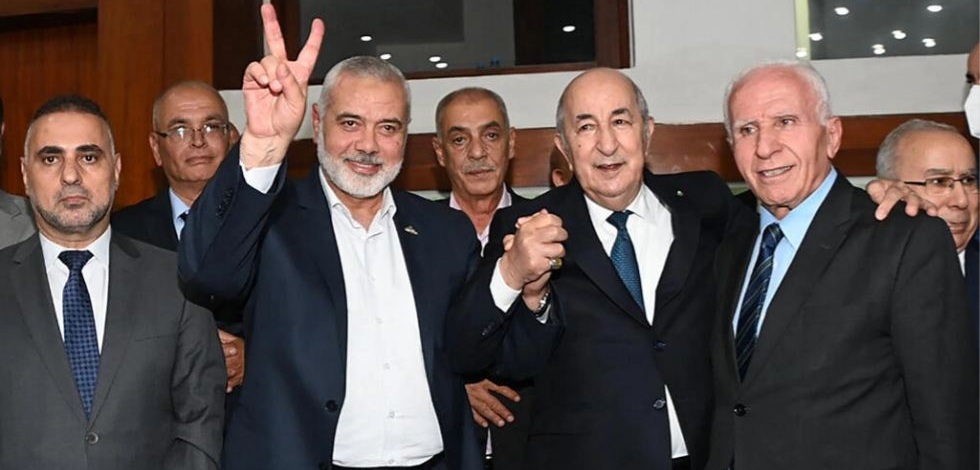Alwaght- Though for years the Israeli regime separated the West Bank and Gaza by occupation and fueled gaps between the leaders of the two regions, things have changed now and the Palestinians reconciled after years of division. Leaders of Hamas, Islamic Jihad, and Fatah in recent days gathered in Algeria and signed a peace agreement. The agreement seeks a set of goals including strengthening of Palestinian Liberation Organization (PLO) as the only legal representative of the Palestinian people, holding the presidential and parliamentary elections in Gaza and West Bank a year after the agreement, activating the mechanisms of the Palestinian groups’ secretary-generals, uniting internal ranks, and realizing national unity and political participation. Also, according to the deal, an Algerian and Arab task force will oversee the implementation of the terms of agreement in association with the Palestinians themselves. The Palestinian groups also stressed the need for commitment to popular resistance and the Palestinian right for resistance by all means.
To get an elaboration on the deal, Alwaght talked to Saadullah Zaree, an expert of West Asian developments.
Alwaght: Since 2007 that inter-Palestinian disputes erupted, many efforts have been made to reconcile Gaza and West Bank leaders but until recently, these efforts were unsuccessful. What factors have driven the Palestinians to agree to reconciliation in the present conditions? What were the grounds for the agreement?
Zaree: In fact, one driver of this agreement is the internal Palestinian issues, among them the demands to settle the economic and executive problems of the people that appeared in past years. Since there were no elections since 2007, the problems piled up and prevented any agreement. There had to be a solution for these problems. Fortunately, various Palestinian groups concluded that they need to settle their differences and Algeria conference was driven by this conclusion.
Compared to the other Arab states, Algeria has more consistent ties with the Palestinians than other Arab states and arranged the conference at a good time. Another driving force behind the detente and cooperation among Palestinian factions is the Israeli regime that in recent years took advantage of the inter-Palestinian division for its interests. In the past two years, we witnessed many Israeli attacks on the divided Palestinians but now the Israelis are aware that they are facing a united Palestine.
Alwaght: Given the reconciliation terms, is there a hope for these groups to hold presidential and parliamentary elections across Palestine?
Zaree: These groups have agreed after long years which means that they have accepted that their problems are serious and should be settled and when they sign the agreement, they must commit to its terms. But whether they would cooperate over time or not is a matter of time. They have to maintain their cooperation and respect the deal’s terms and do not violate them. I think that there is a lot of hope they will implement this agreement.
Alwaght: Have they talked about these issues in their conference or they just agreed to a general framework?
Zaree: Before this agreement, there were debates on these issues. Since last year and specifically since Operation Sword of Al-Quds against the Israeli regime, the Fatah Movement backed the resistance agenda and the operation and Palestinian Authority roughly went passive and allowed cooperation among the Palestinian factions. Actually, the ground for such cooperation among Hamas, Fatah, Islamic Jihad, and Palestinian Authority had emerged earlier and was boosted after 11-day war.
Alwaght: Once issue raised by the resistance groups is that Fatah and Palestinian Authority President Mahmoud Abbas use these negotiations as a leverage against their regional backers when they pressure them and so are not serious about the agreement. How committed would be Fatah this time to its promises?
Zaree: Certainly, Abbas has turned to cooperation with other Palestinian groups to regain his position among the Palestinians and Arab states as he has been losing it. Indeed, it is not bad for Abbas to use this agreement to persuade the Arabs to cooperate with the Palestinians and centralize the Palestinian cause, and this is not something Hamas or the Islamic Jihad are opposed to. The important matter is that Abbas looks at these agreements as a periodic and passing mechanism; rather than a long-term strategy. It is noteworthy that the Arab approach to the Palestinian cause is a product of such agreements among the Palestinians and as long as there is inter-Palestinian consensus, Abbas can secure a prominent position among the Arabs and if their agreements are shaky, Abbas’s position will go shaky.
Alwaght: Presently, Palestinian conditions are in a way that anti-Israeli struggle in the West Bank by Palestinian groups is more serious than before and has already entered armed phase. What is the effect of this agreement on the Israeli security situation and a new Palestinian anti-occupation intifada?
Zaree: Definitely, this deal will influence formation of a new intifada and intensification of resistance in the West Bank. Actually, unity and coordination among the Palestinian groups uplifts the self-confidence of the West Bank and encourages their anti-Israeli struggle.
Alwaght: Looking at this agreement in a more general regional framework, do you think the real gainer of this agreement is the Axis of Resistance or the compromising Arab sides?
Zaree: The Palestinians agreed around cooperation, convergence, and resistance, and since Operation Sword of Al-Quds, it was Fatah and Palestinian Authority that leaned to Hamas and Islamic Jihad. So, this unity bolsters the Resistance camp’s position. Still, we need to take it into consideration that the Resistance camp is not totalitarian to consider settlement of the problems of people in Gaza and the West Bank insignificant. Since this agreement is a consolidation of power for solving the people's problems, the resistance groups would help Palestinian Authority do its duties to the West Bank residents more comfortably.



























